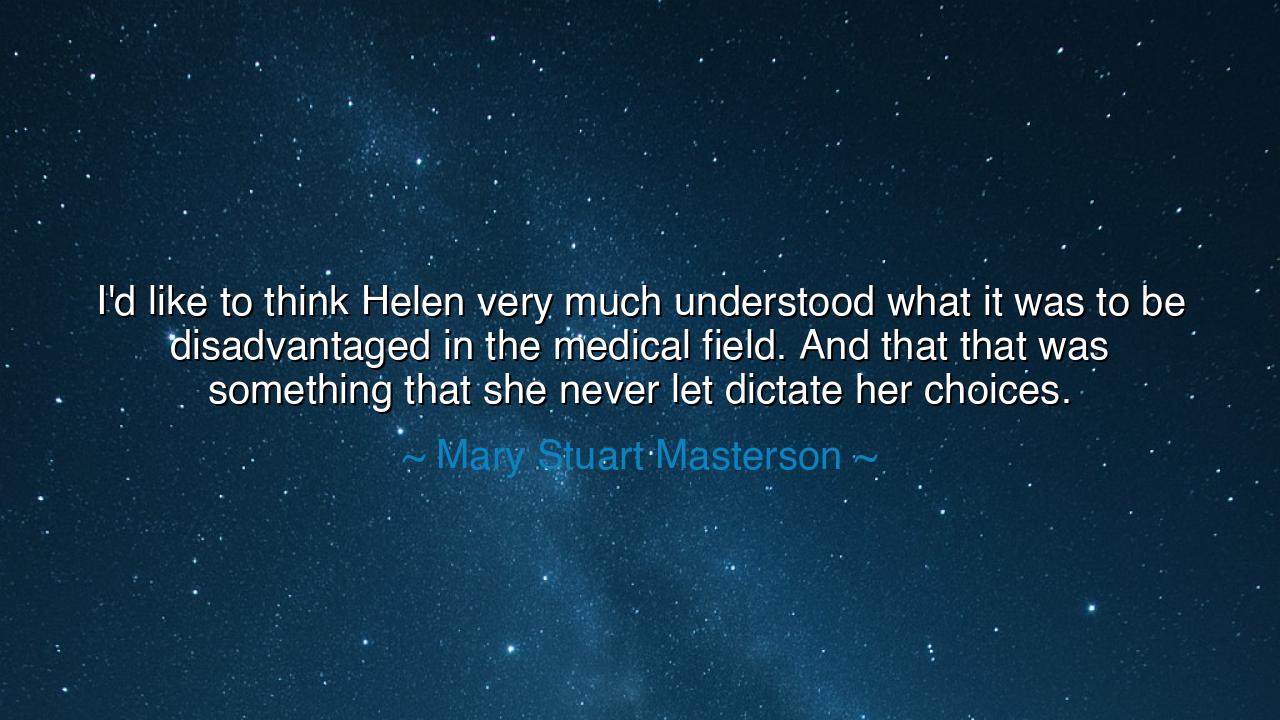
I'd like to think Helen very much understood what it was to be
I'd like to think Helen very much understood what it was to be disadvantaged in the medical field. And that that was something that she never let dictate her choices.






Hearken to the words of Mary Stuart Masterson, whose reflection illuminates the enduring power of resilience and principle. She observes, “I’d like to think Helen very much understood what it was to be disadvantaged in the medical field. And that that was something that she never let dictate her choices.” In this simple yet profound statement lies a timeless truth: adversity, while real and formidable, need not determine the course of one’s life. True character is revealed not in the absence of challenge, but in the courage to act with integrity and vision despite it.
Since antiquity, men and women of wisdom have celebrated the triumph of courage over circumstance. In ancient Greece, Socrates faced the prejudices of society and the restrictions of his station, yet he pursued philosophy with steadfast dedication. Masterson’s words echo this principle: awareness of disadvantage is not an excuse for inaction; rather, it is a call to deliberate choice, moral fortitude, and the courage to pursue what is just and meaningful. Helen, in her understanding and resilience, embodies this ancient virtue.
Consider the story of Elizabeth Blackwell, the first woman to receive a medical degree in the United States. She confronted entrenched bias, skepticism from colleagues, and social barriers at every turn. Yet she did not allow her disadvantage to dictate her choices; she pursued her studies with determination and ultimately transformed the medical field for generations of women to come. Like Helen, she demonstrates that the measure of one’s life is defined not by obstacles but by the integrity with which one navigates them.
Masterson’s observation also emphasizes the moral responsibility that accompanies awareness. To understand disadvantage is not merely to recognize hardship, but to act with empathy, courage, and commitment. Helen’s refusal to allow bias or inequality to dictate her decisions reflects a principle the ancients revered: the cultivation of inner strength and moral clarity in the face of external constraints. True leaders and pioneers do not yield to circumstance—they transform it.
This reflection resonates beyond the medical field. In any profession or vocation, individuals encounter structural barriers, prejudice, or limitation. The lesson is enduring: awareness of such obstacles should inspire strategy, preparation, and persistence, not resignation. By maintaining commitment to principle and purpose, one can achieve excellence even in fields historically resistant to inclusivity, as Helen’s example demonstrates.
The moral lesson is clear: recognize the forces of disadvantage, yet refuse to let them govern your choices. Cultivate courage, integrity, and perseverance. As Masterson notes, Helen’s example teaches that greatness lies in steadfast adherence to purpose, regardless of societal or institutional barriers. In doing so, one uplifts not only oneself but the broader community, paving the way for those who follow.
Practical guidance flows naturally: identify the challenges and biases in your path, but plan and act with intentionality rather than fear. Seek mentors, allies, and strategies that allow you to navigate systemic obstacles without compromising your principles. Like Helen, do not permit disadvantage to dictate your choices; instead, let your vision, skill, and resolve chart the course.
Thus, heed the wisdom of Mary Stuart Masterson: true mastery and moral strength are forged not in the absence of difficulty, but in the conscious refusal to be governed by it. By embracing challenge with clarity and courage, we honor the legacy of pioneers past and cultivate a path of excellence and integrity for generations yet to come.






AAdministratorAdministrator
Welcome, honored guests. Please leave a comment, we will respond soon